|
By Sam Burnham @C_SamBurnham 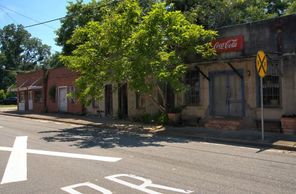 Pitts, Ga (Photo Courtesy Vanishing South Georgia) Pitts, Ga (Photo Courtesy Vanishing South Georgia) We often hear the old adage that those who do not study history are doomed to repeat it. That sounds morbid, particularly to a historian that cherishes so many of the treasures from days gone by. What if the repeating of history were not a curse? History as a whole is not a journey through loathsome atrocities that we'd all be better off forgetting. Some of it was quite winsome, perhaps even worthy of repeating. That is the point I want to focus on in this post 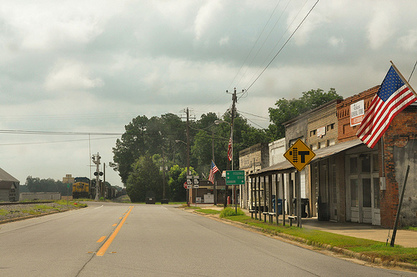 Rebecca, Ga (Photo Courtesy Vanishing South Georgia) Rebecca, Ga (Photo Courtesy Vanishing South Georgia) Georgia is speckled with a plethora of small towns. Often, town might not be the right word. If a home is the people in it, than may of these towns have, at least metaphorically, ceased to be. There are still a scattering of residents but the shops are closed up, the industries shuttered, All that remains are the structures that were left along the now quieted streets. Weeds may have crept in and the pavement may be cracked but we are left with an image of what once was. 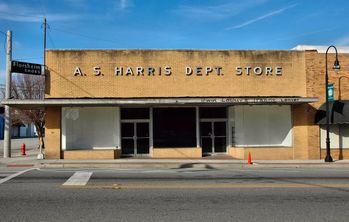 Ocilla, Ga (Photo Courtesy Vanishing South Georgia) Ocilla, Ga (Photo Courtesy Vanishing South Georgia) While the Peach State is blessed with thriving historic downtowns in places like Rome, Columbus, Cartersville, Milledgeville, and, of course, Savannah, many more of the old towns are sitting, waiting to see what happens next. And for far too long what has happened is nothing. 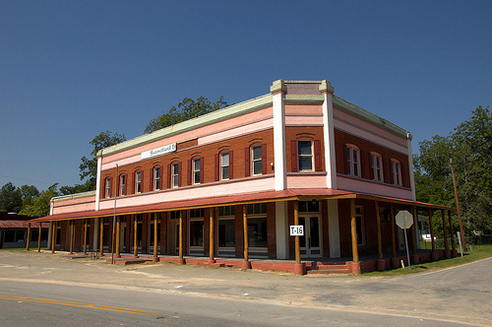 Toomsboro, Ga (Photo Courtesy Vanishing South Georgia) Toomsboro, Ga (Photo Courtesy Vanishing South Georgia) Occasionally, you encounter a town where someone stepped in, invested some money to refurbish a building or two in hopes of sparking a revitalization. They may have even started a unique enterprise in hopes of attracting visitors...and money. But more often than not, there was a sad ending. And now a refurbished building sits empty, probably surrounded by others that look a little more weathered. 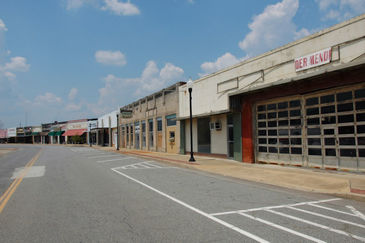 Donalsonville, Ga (Photo Courtesy Vanishing South Georgia) Donalsonville, Ga (Photo Courtesy Vanishing South Georgia) There are several reasons that a town might have died. Their local traffic artery may have been replaced by the new superhighway that bypassed town. The local cotton mill might have relocated to another country in search of cheaper labor and operating costs. The younger residents may have left for the big city, searching for excitement and opportunity. Our economy has, in recent decades, favored the larger cities, leaving the rural towns trying to survive after being born in an era where local businesses were more sustainable and therefore more profitable. 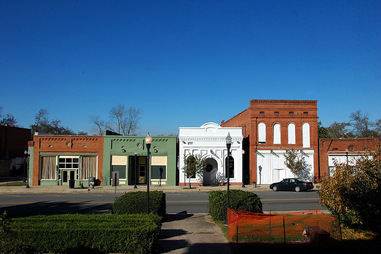 Talbotton, Ga (Photo Courtesy Vanishing South Georgia) Talbotton, Ga (Photo Courtesy Vanishing South Georgia) However, as real estate prices soar in the urban areas, I wonder if we will reach a time when doing business in these small towns might once again become more profitable. We have the strength of the connections offered to us by the technological advances of the past few decades. Our ability to communicate in real time has erased distances and allowed us to be in several places at once. It's as if a business operating in Talbotton could be in metro Atlanta, or even Boston or New York, while paying rural Georgia rent and taxes. 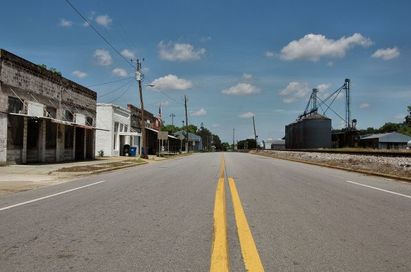 Rebecca, Ga (Photo Courtesy Vanishing South Georgia) Rebecca, Ga (Photo Courtesy Vanishing South Georgia) If such an idea were to catch on, these small towns, with some existing infrastructure, could be brought up to speed with the larger cities. If businesses that are capable of bringing money into the local economy were to relocate, it could raise the market demands for service industry jobs to return. There would be a greater demand for the arts - which is not always lacking in these towns. Music festivals and venues, as well as community theater already exist in many of these towns. And considering the variety of buildings that are available - ranging from churhces, tho cotton warehouses, the tobacco barns - the opportunities could be limited by only the imagination. 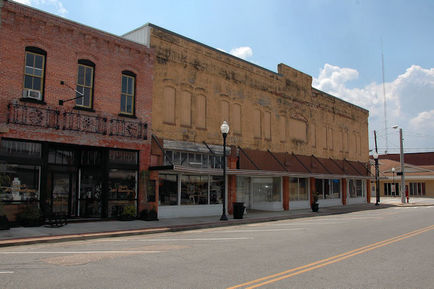 Donalsonville, Ga (Photo Courtesy Vanishing South Georgia) Donalsonville, Ga (Photo Courtesy Vanishing South Georgia) As the popularity of locally-owned businesses grows, these small towns could provide a home to people who wish to start something different but might be looking for a slower pace of life. Bringing these towns back, on some level, would be a healthy thing for Georgia - and so many other Southern states that have these same types of towns. The economic and cultural strength that they could provide would diversify the economy of the state and spread out resources more evenly across the state. We could see a revitalization of hospitals and schools in the rural areas. The real estate and some level of infrastructure is available. Many of these towns have access to highways and railroads. The electrical, water, and other utility systems are already in place. There are already streets and roads, churches, schools, even the buildings that can hold businesses are already in place. They are just waiting for someone with an eye for polishing a diamond in the rough. It could be an opportunity whose time has come. It's just a matter of details. ...To Be Continued... All of the photos in this post were graciously provided by Brian Brown at Vanishing South Georgia. The fact that Brian has published such prolific blogs featuring the vanishing history of North, South and Coastal Georgia speaks to the existence of these disappearing communities. Much of what Brian documents is already gone or is beyond saving but there is much more on his sites that are ripe for the scenario I've laid out above.
If you like the photos you've seen in this post, check out his sites: https://vanishingsouthgeorgia.com/ https://vanishingnorthgeorgia.com/ https://vanishingcoastalgeorgia.com/
4 Comments
9/22/2016 08:26:42 am
I think there's a recipe for this: upgrade technology (fast internet, clean energy) and attract the people who can work anywhere. I work for a company based in Brooklyn, but live in Savannah, and do so intentionally. I don't want to live in a big city. I don't want to fight traffic. I like not having a commute (and love working my gym shorts). Remote work is coming and is going to be huge. If you can sell a lifestyle, and give people the tools they need to get their jobs done (again, fast affordable internet), you can attract the people who can build the tax base, spend money in local restaurants and help rebuild these beautiful places.
Reply
Sam
9/22/2016 12:40:23 pm
Kevin, you are right on the money. The energy and infrastructure components will be discussed in future posts. I'm betting there are many people like you who wish to do what is thought of as a big city job while they are still able to live a small town life. It's the best of both worlds. And if those people have realistic places to do that, they can play an important role in rebuilding the communities we're talking about.
Reply
Donna Brumby
9/23/2016 06:08:21 pm
Bandwidth is key. With sufficient access, lots of different kinds of work can be accomplished in any location. Another essential is honest, hardworking, educated, publicly-minded local elected officials.
Reply
Sam
9/24/2016 09:18:19 am
Yes, the bandwidth issue id going to be a challenge in many locations. Technology is advancing rapidly but it is mostly advancing where there are currently customers. So that is a challenge to most of the towns in question. Leave a Reply. |
Sam B.Historian, self-proclaimed gentleman, agrarian-at-heart, & curator extraordinaire Social MediaCategories
All
Archives
November 2022
|




 RSS Feed
RSS Feed
